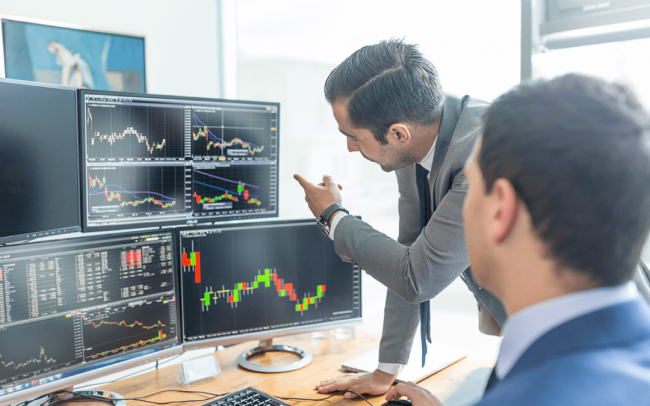Forex trading, also known as foreign exchange trading, offers an exciting opportunity to participate in the global currency markets. However, to navigate this dynamic market successfully, it's essential to acquire the right knowledge and skills. In this comprehensive guide, we will delve into Forex trading education, covering the basics, strategies, risk management, and market psychology. Whether you're a beginner exploring the world of Forex or an experienced trader looking to sharpen your skills, this article will serve as a valuable resource on your journey to becoming a proficient Forex trader.
Table of Contents
- What is Forex Trading?
- The Benefits of Forex Trading Education
- Understanding Currency Pairs and Market Participants
- Technical Analysis in Forex Trading
- Fundamental Analysis in Forex Trading
- Developing Forex Trading Strategies
- Risk Management in Forex Trading
- Emotions and Psychology in Forex Trading
- Choosing a Forex Trading Platform
- Continual Learning and Improvement
- Frequently Asked Questions (FAQs)
- Conclusion

1. What is Forex Trading?
Forex trading involves buying and selling currencies in the global foreign exchange market. It is the largest and most liquid financial market, with trillions of dollars traded daily. Forex traders aim to profit from fluctuations in currency exchange rates by speculating on whether a currency will appreciate or depreciate against another. Transactions take place electronically through decentralized platforms, allowing traders to participate from anywhere in the world.
2. The Benefits of Forex Trading Education
Forex trading education is crucial for traders at all levels. Here are some key benefits of acquiring Forex trading education:
- Knowledge: Education provides a foundation of knowledge about Forex markets, terminology, trading techniques, and strategies.
- Risk Management: Education teaches traders how to manage risk effectively, which is vital for long-term success in Forex trading.
- Skill Development: Education equips traders with technical and fundamental analysis skills, allowing them to make informed trading decisions.
- Confidence: With education comes confidence, as traders gain a deeper understanding of market dynamics and their own trading strategies.
- Adaptability: The Forex market is constantly evolving. Education helps traders stay updated on new trends, tools, and techniques to adapt their trading strategies accordingly.
3. Understanding Currency Pairs and Market Participants
Currency pairs are the foundation of Forex trading. Understanding how currency pairs work and the different market participants is essential. Some key points to grasp include:
- Major Currency Pairs: The most actively traded currency pairs are known as major pairs, including EUR/USD, USD/JPY, GBP/USD, and USD/CHF.
- Cross Currency Pairs: Cross pairs do not involve the US dollar and include currency pairs like EUR/GBP or GBP/JPY.
- Market Participants: Market participants in Forex trading include banks, corporations, institutional investors, retail traders, and central banks.
4. Technical Analysis in Forex Trading
Technical analysis involves studying historical price charts and using indicators to predict future price movements. Key aspects of technical analysis include:
- Candlestick Charts: Candlestick charts display price information for a specified time period, offering insights into market sentiment and price patterns.
- Support and Resistance Levels: Support and resistance levels indicate areas where price is likely to encounter buying or selling pressure.
- Indicators: Technical indicators, such as moving averages, MACD, and RSI, help identify trends, momentum, and potential reversals.
5. Fundamental Analysis in Forex Trading
Fundamental analysis focuses on economic, political, and social factors that influence currency values. Important elements of fundamental analysis include:
- Economic Indicators: Economic indicators, such as GDP, inflation rates, employment data, and central bank policies, provide insights into a country's economic health.
- News Events: News releases, such as interest rate decisions or geopolitical developments, can have a significant impact on currency values.
- Market Sentiment: Understanding market sentiment involves assessing how traders and investors perceive economic and political developments.
6. Developing Forex Trading Strategies
Successful Forex trading requires the development of effective trading strategies. Here are a few popular trading strategies to consider:
- Trend Trading: Trend traders aim to profit from sustained price movements in a particular direction, either upward (bullish) or downward (bearish).
- Range Trading: Range traders focus on buying at support levels and selling at resistance levels, taking advantage of price oscillations within a defined range.
- Breakout Trading: Breakout traders seek to enter trades when price breaks out of a defined range or significant price level, expecting a strong move in the breakout direction.
- Swing Trading: Swing traders aim to capture shorter-term price swings within a larger trend, entering and exiting trades based on price reversals or retracements.
7. Risk Management in Forex Trading
Effective risk management is crucial to protect trading capital and ensure long-term profitability. Key principles of risk management include:
- Position Sizing: Determine the appropriate position size for each trade based on risk tolerance and account size.
- Stop Loss Orders: Place stop loss orders to limit potential losses in case the market moves against your position.
- Take Profit Orders: Set take profit orders to secure profits by automatically closing positions when predetermined profit targets are reached.
- Diversification: Diversify your trading portfolio by trading different currency pairs and incorporating other asset classes.
8. Emotions and Psychology in Forex Trading
The psychological aspect of Forex trading plays a significant role in success or failure. Here are some tips to manage emotions and maintain a disciplined mindset:
- Patience: Avoid impulsive trades and wait for favorable setups that align with your trading strategy.
- Emotion Control: Learn to control fear and greed, as they can lead to irrational decisions and impede objective analysis.
- Journaling: Keep a trading journal to track trades, emotions, and lessons learned. Regularly review your journal to identify patterns and areas for improvement.
- Continuous Learning: Stay committed to ongoing education and self-improvement. Attend webinars, read books, and engage with other traders to expand your knowledge and network.
9. Choosing a Forex Trading Platform
Selecting the right Forex trading platform is essential for a seamless trading experience. Consider the following factors when choosing a platform:
- Reliability: Ensure the platform is stable and provides accurate real-time data.
- User-Friendly Interface: Look for a platform with an intuitive interface and comprehensive charting tools.
- Execution Speed: Choose a platform with fast execution speeds to take advantage of market opportunities.
- Risk Management Tools: Check if the platform offers risk management features, such as stop loss and take profit orders.
10. Continual Learning and Improvement
Forex trading is a journey of continuous learning and improvement. Some strategies to enhance your trading skills include:
- Demo Trading: Practice trading with virtual money using a demo account to test strategies and build confidence.
- Backtesting: Use historical data to assess the performance of trading strategies and identify areas for improvement.
- Join Trading Communities: Engage with other traders in forums or social media groups to share ideas, insights, and experiences.
- Stay Informed: Stay updated on market news, economic indicators, and geopolitical events that may impact currency markets.
11. Frequently Asked Questions (FAQs)
Here are some frequently asked questions about Forex trading education:
Q: Can anyone learn Forex trading?
A: Yes, anyone can learn Forex trading with dedication, education, and practice. However, trading involves risk, and it's important to approach it with a disciplined mindset.
Q: Do I need a large amount of capital to start Forex trading?
A: Forex trading allows for flexible capital requirements, and traders can start with small amounts. However, it's important to manage risk and avoid overexposing your account.
Q: How long does it take to become a successful Forex trader?
A: The time required to become a successful Forex trader varies based on individual commitment, learning pace, and market conditions. It's an ongoing journey that requires continuous education and practice.
Q: Can Forex trading be a full-time career?
A: Forex trading can be a full-time career for those who dedicate themselves to learning and developing their skills. However, it's important to start with realistic expectations and a solid foundation of knowledge.
Q: What are the risks involved in Forex trading?
A: Forex trading carries inherent risks, including market volatility, leverage risks, and the potential for losses. Risk management and a disciplined approach are essential to mitigate these risks.
Q: Are there Forex trading courses available for beginners?
A: Yes, there are numerous Forex trading courses, both online and offline, tailored for beginners. These courses cover the basics, strategies, and risk management techniques.
12. Conclusion
Forex trading education is a vital step towards becoming a proficient and successful Forex trader. By acquiring knowledge about the Forex market, technical and fundamental analysis, risk management, and market psychology, traders can develop effective strategies and make informed trading decisions. Remember, Forex trading requires continuous learning, practice, and a disciplined mindset. With dedication and the right education, you can unlock the potential of Forex trading and embark on a rewarding journey.
















